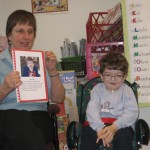Before Ben got his trach in July 2006, he used to fall asleep on the way to his 3 day a week preschool, would barely stay awake during the 2 1/2 hour day, and then would again fall asleep on the way home. In addition, he suffered enormous pain, which only seemed to briefly be relieved through twice weekly acupuncture treatments at Children’s Hospital Boston. I had no idea how he would ever go to school for a full day–let alone make friends, enjoy himself and learn anything in the process.
But after the trach surgery, and when Ben could finally breathe without a struggle, he had more energy, he slept well at night, he was no longer in pain, he was able to eat and gain weight–and he was able to learn! Ben had always been great at memorization. Because he never has had full command of all his five senses, he has relied on memory for so much of his life. He is a mental math expert. By age 4 he knew all of the U.S. state capitals. He began playing the piano at age 5 and he instantly memorized his music. And learning technology came natural to him.
The Wellesley Public Schools and the Department of Special Education have been true partners on our educational journey. Each fall, at Ben’s annual Individualized Education Plan meeting, and throughout the year at our quarterly IEP update meetings, the team of teachers, teaching assistants, department head of special education, special educators, physical therapists, occupational therapists, speech therapists, teacher of the visually impaired, the assistive technology specialist, and us, the parents, meet to discuss our educational and social goals for Ben’s new academic year. We discuss upcoming medical and surgical issues and how these may impact his learning and social goals. We make plans for the classroom–for example, the need for a new desk to accommodate a larger wheelchair–in advance of any changes so that no time is lost in the educational plan. I am amazed how often needs are identified before I have even brought them up. We’ve been surrounded by a team of proactive supporters who want to see Ben succeed, just as he would if he were able-bodied.
On this page, I’ll talk about some of the successful strategies we’ve used in working with teachers, administrators and clinicians to create the right learning environment for Ben. I’ll also talk about the inclusive activities we’ve helped to create to make sure the Ben has a place where he fits in and where others appreciate him. I’d also love to know what others have done in their educational initiatives to create inclusive environments for their children with special health care needs.

